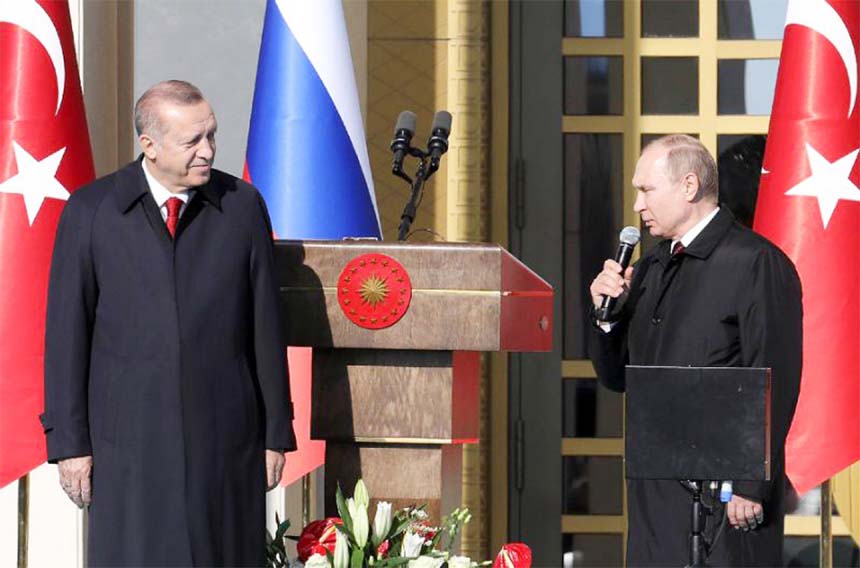
AFP, Ankara :
Russian President Vladimir Putin Tuesday launched the construction of Turkey’s first nuclear power station and vowed to accelerate the delivery of air defence systems to Ankara, in a new tightening of an increasingly close alliance that has alarmed NATO.
Putin held several hours of talks with Turkish counterpart Recep Tayyip Erdogan on the first of a two-day visit to Ankara that will see the two strongmen leaders joined on Wednesday by Iranian President Hassan Rouhani for a summit devoted to Syria.
Their meeting in Ankara opened with Putin and Erdogan, via video conference, talking about the construction of a nuclear power station in the Mediterranean Mersin region, a $20 billion project that will come online in half a decade.
Putin then said he and Erdogan had decided to “speed up” the delivery of S-400 air defence missile systems to Ankara, a purchase that has raised concerns among Turkey’s NATO partners.
Russian officials had said in December that the first deliveries in the $2 billion deal were likely to begin at the end of 2019 or beginning of 2020.
Putin and Erdogan-who have both led their post-imperial states out of economic crisis but also into a new era of confrontation with the West-have forged an increasingly close alliance in recent months.
In a sign of the importance of the partnership, Putin’s visit to Turkey is his first trip abroad since he won a historic fourth presidential mandate in March 18 polls.
Their meeting came as ties between Russia and the West are nosediving to post-Cold War lows after last month’s poisoning of Russian ex-double agent Sergei Skripal and his daughter in the UK.
While EU powers have rushed to join Britain in condemning Russia and expelling diplomats over the attack on Skripal, Turkey has been much more circumspect.
Erdogan, who in 2017 held eight face-to-face meetings with Putin and already spoke to the Russian leader seven times by phone this year, has said that Ankara will not act against Moscow “based on an allegation”.
But Ankara-Moscow relations were also tested by a severe crisis from November 2015 when Turkey shot down a Russian warplane over Syria, a confrontation both sides are trying to put behind them.
Despite being on different sides of the Syrian civil war, key regime backers Russia and Iran have joined with rebel-supporting Turkey to push forward a peace process but also to ensure influence in Syria once the conflict ends.
“God willing we will continue to work together… to establish Syria’s stability as well as its peace and security,” said Erdogan.
Russian President Vladimir Putin Tuesday launched the construction of Turkey’s first nuclear power station and vowed to accelerate the delivery of air defence systems to Ankara, in a new tightening of an increasingly close alliance that has alarmed NATO.
Putin held several hours of talks with Turkish counterpart Recep Tayyip Erdogan on the first of a two-day visit to Ankara that will see the two strongmen leaders joined on Wednesday by Iranian President Hassan Rouhani for a summit devoted to Syria.
Their meeting in Ankara opened with Putin and Erdogan, via video conference, talking about the construction of a nuclear power station in the Mediterranean Mersin region, a $20 billion project that will come online in half a decade.
Putin then said he and Erdogan had decided to “speed up” the delivery of S-400 air defence missile systems to Ankara, a purchase that has raised concerns among Turkey’s NATO partners.
Russian officials had said in December that the first deliveries in the $2 billion deal were likely to begin at the end of 2019 or beginning of 2020.
Putin and Erdogan-who have both led their post-imperial states out of economic crisis but also into a new era of confrontation with the West-have forged an increasingly close alliance in recent months.
In a sign of the importance of the partnership, Putin’s visit to Turkey is his first trip abroad since he won a historic fourth presidential mandate in March 18 polls.
Their meeting came as ties between Russia and the West are nosediving to post-Cold War lows after last month’s poisoning of Russian ex-double agent Sergei Skripal and his daughter in the UK.
While EU powers have rushed to join Britain in condemning Russia and expelling diplomats over the attack on Skripal, Turkey has been much more circumspect.
Erdogan, who in 2017 held eight face-to-face meetings with Putin and already spoke to the Russian leader seven times by phone this year, has said that Ankara will not act against Moscow “based on an allegation”.
But Ankara-Moscow relations were also tested by a severe crisis from November 2015 when Turkey shot down a Russian warplane over Syria, a confrontation both sides are trying to put behind them.
Despite being on different sides of the Syrian civil war, key regime backers Russia and Iran have joined with rebel-supporting Turkey to push forward a peace process but also to ensure influence in Syria once the conflict ends.
“God willing we will continue to work together… to establish Syria’s stability as well as its peace and security,” said Erdogan.

